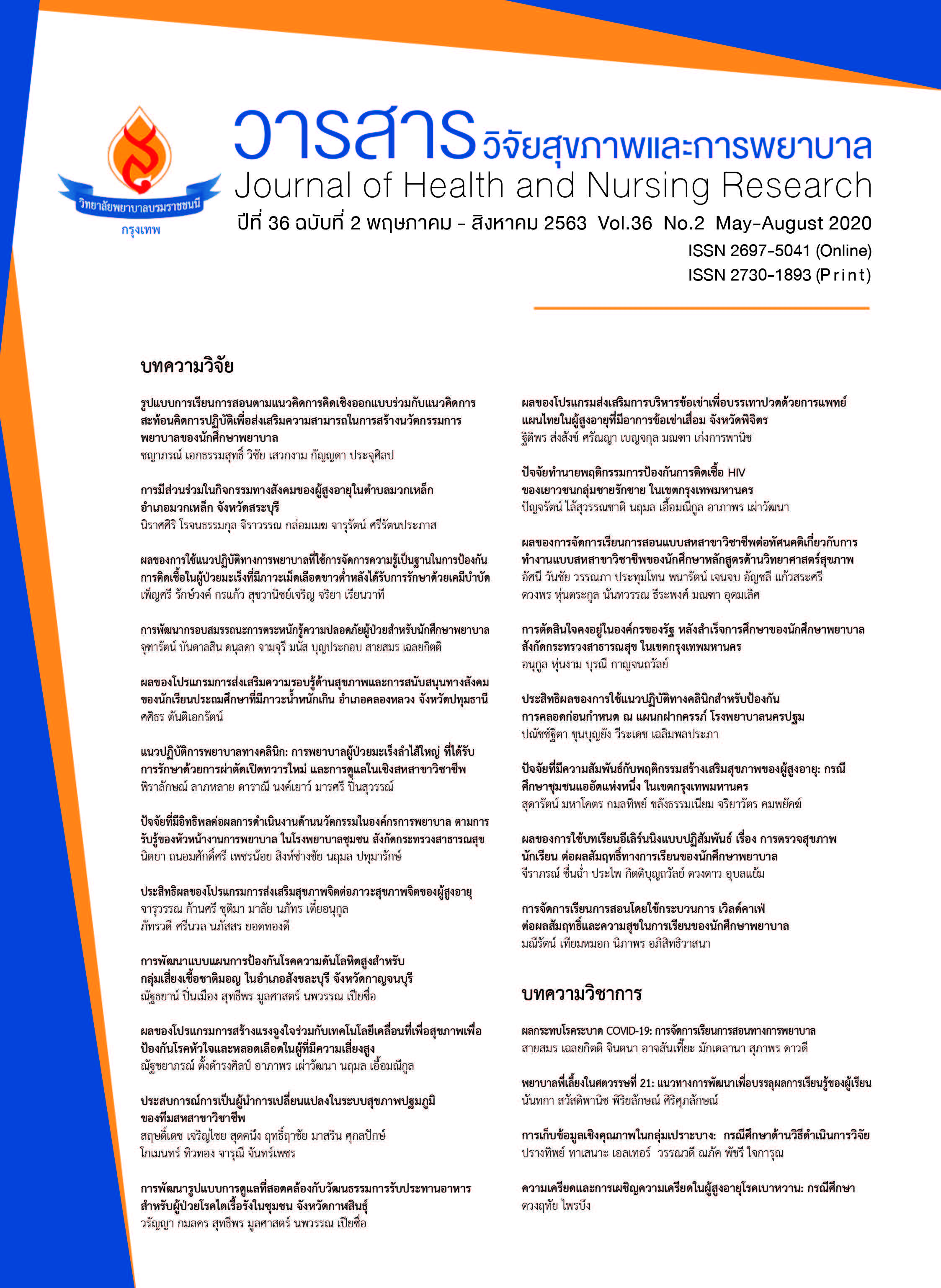การเก็บข้อมูลเชิงคุณภาพในกลุ่มเปราะบาง: กรณีศึกษาด้านวิธีดำเนินการวิจัย
คำสำคัญ:
กรณีศึกษาด้านวิธีดำเนินการวิจัย, กลุ่มเปราะบาง, ข้อมูลเชิงคุณภาพบทคัดย่อ
การเก็บข้อมูลในการวิจัยเชิงคุณภาพเป็นการเก็บข้อมูลจากผู้เข้าร่วมการวิจัยจำนวนน้อย แต่ต้องการข้อมูลที่ละเอียดลึกซึ้ง ทำให้เสี่ยงต่อการละเมิดสิทธิส่วนตัวของผู้เข้าร่วมการวิจัย และเกิดการหย่อนทางจริยธรรมได้มากกว่าการวิจัยเชิงปริมาณ นักวิจัยจึงต้องดำเนินการวิจัยด้วยความระมัดระวังเป็นพิเศษ โดยเฉพาะการวิจัยในกลุ่มเปราะบาง เช่น ผู้ที่มีความเสี่ยงสูงกว่าบุคคลทั่วไป และผู้ที่อาจไม่มีอิสระในการตัดสินใจอย่างเพียงพอ บทความนี้มีจุดประสงค์ในการนำเสนอกลยุทธ์การเก็บข้อมูลเชิงคุณภาพในพื้นที่ศึกษาของผู้แต่งในรูปแบบกรณีศึกษาด้านวิธีดำเนินการวิจัย โดยมีผู้ร่วมวิจัยเป็นกลุ่มเปราะบาง ได้แก่ หญิงตั้งครรภ์และหลังคลอดทั้งวัยผู้ใหญ่และวัยรุ่น และนักเรียนมัธยมศึกษาตอนต้น เก็บข้อมูลด้วยการสัมภาษณ์ การสนทนากลุ่ม และการสังเกตแบบมีส่วนร่วม บทความนี้เหมาะสำหรับนักศึกษาและนักวิจัยที่ยังไม่มีประสบการณ์ในการทำวิจัยเชิงคุณภาพ
Downloads
เอกสารอ้างอิง
2. Wangsukpisan A, Subgranon R, Chunlestskul K. Lived experience of nursing students during their professional practices in hospitals. J Nurs Health Care 2014;32(3):163-72.
3. Puttaruksa L, Khumyu A, Dallas JC. Standards of transcultural nursing service relying on expert perspective. Nursing Journal of the Ministry of Public Health 2015:66-77.
4. Phoodaangau B, Klankaradi K, Ketjirachot R. Post-delivery hospitalisation experience of mother with pre-natal bleeding caused by placenta previa: A qualitative study. The Journal of Nursing Council 2015;30(3):79-97.
5. Charnaram S. Practical guidelines for research’s ethical analysis in the processes of conducting a qualitative research. ARU Research Journal. 2018;5(1):79-86.
6. Horpibulsuk N. The compromising of ethical ideals in gathering qualitative data. Suratthani Rajabhat Journal 2019;6(1):21-42.
7. Nantamongkolchai S. Ethics in humans: Principle and practice of public research. Bangkok: Prayoonsanthai:2017
8. Lamchang S, Chanprasit C, Thaprom A, Srisuphan W. Analysis of research protocols submitted for ethical review to research ethics committee, faculty of nursing, Chiang Mai University in 2014. Nursing Journal 2015;42(Supplement December):82-93.
9. Creswell JW. Qualitative inquiry and research design: Choosing among five traditions. Thousand Oaks, CA: Sage; 1998.
10. Streubert HJ, Carpenter DR. Qualitative research in nursing: Advancing the humanistic imperative. 5 ed. Philadelphia: Wolters Kluwer; 2011.
11. Pongsuwan C, Boddy J, Woods M, Balthip K. How Thai undergraduate nursing students learned to develop their knowledge and skills in clinical practices: A grounded theory research study. Princess of Naradhivas University Journal 2018;10(2):64-76.
12. Code of Federal Regulations. Title 45 Public Welfare, Department of Health and Human Services, Part 46, Protection of Human Subjects [Internet]. 2009 [cited 2009 Jul 14]. Available from https://www.hhs.gov/ohrp/sites/default/files/ohrp/policy/ohrpregulations.pdf
13. Thasanoh P. Northeast Thai women's experiences in following traditional postpartum practices [doctoral's thesis]. [San Francisco]: University of California, San Francisco; 2010.
14. Neamsakul W. Unintended Thai adolescent pregnancy: A grounded theory study [doctoral's thesis].[San Francisco]: University of California, San Francisco; 2008.
15. Jaigarun P. Development and testing of a culturally-adapted measure of the drinker prototype for Thai adolescents. [doctoral's thesis]. [Illinois]:
University of Illinois at Chicago, Illinois; 2016.
16. Strauss A. Qualitative analysis for social scientists. New York: Cambridge university press; 1987.
17. Strauss A, Corbin J. Basics of qualitative research: grounded theory procedures and techniques. Newbury Park: Sage publications; 1990.
18. Lincoln YS, Guba EG. Naturalistic inquiry. Beverly Hills, CA: Sage; 1985.
19. Gerrard M, Gibbons FX, Houlihan AE, Stock ML, Pomery EA. A dual-process approach to health risk decision making: the prototype willingness model. Developmental Review 2008;28(1):29-61.
20. Gerrard M, Gibbons FX, Brody GH, Murry VM, Cleveland MJ, Wills TA. A theory-based dual-focus alcohol intervention for preadolescents: The Strong African American Families Program. Psychol Addict Behav 2006;20:185-95.
21. Gerrard M, Gibbons FX, Reis-Bergan M, Trudeau L, Vande Lune LS, Buunk B. Inhibitory effects of drinker and nondrinker prototypes on adolescent alcohol consumption. Health Psychology 2002;21(6):601-9.
22. Morgan DL. Focus groups. Annual Review of Sociology 1996;22:129-52.
23. Brown BB. Peer groups and peer culture. In: Feldman SS, Elliott GR, editor. At the threshold: The developing adolescent. Cambridge, MA: Harvard University Press; 1990. P.171-196.
ดาวน์โหลด
เผยแพร่แล้ว
รูปแบบการอ้างอิง
ฉบับ
ประเภทบทความ
สัญญาอนุญาต
บทความที่ได้รับการตีพิมพ์ เป็นลิขสิทธิ์ของวารสารวิจัยสุขภาพและการพยาบาล (วิทยาลัยพยาบาลบรมราชชนนี กรุงเทพ) ไม่สามารถนำไปตีพิมพ์ซ้ำในวารสารฉบับอื่น


















